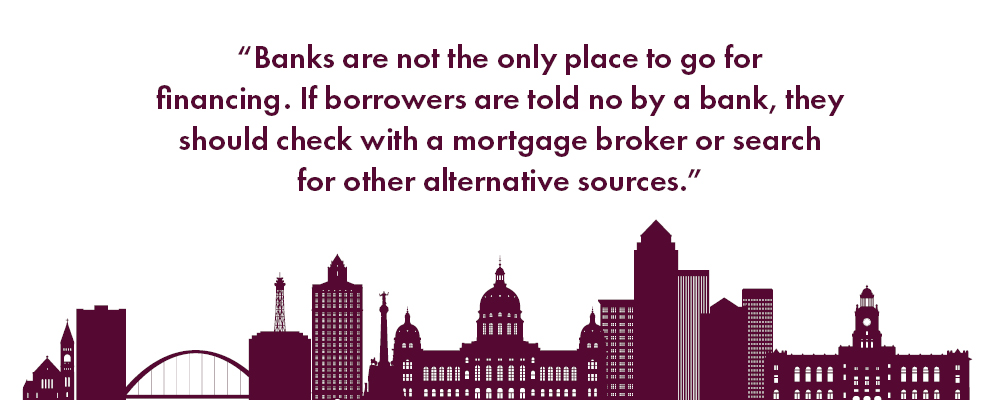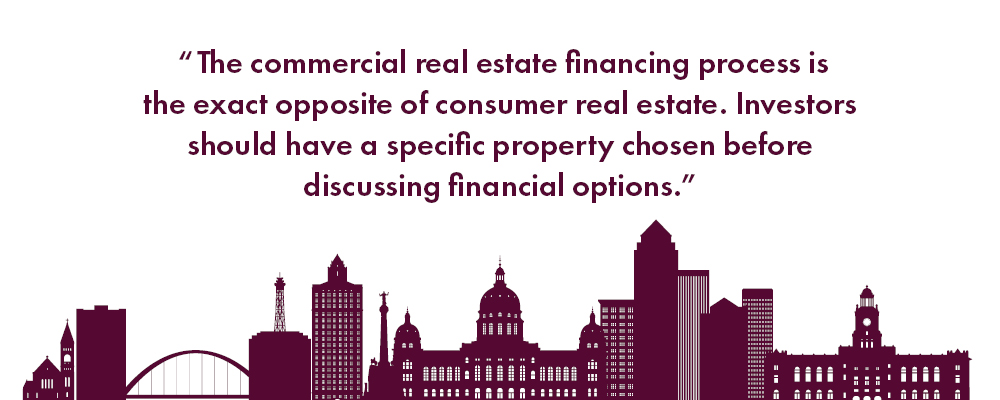Commercial real estate investors might want to keep an open mind when looking for financing options for their property investments. Traditionally, investors would go from bank to bank to “shop around” for the best rates and loan financing opportunities for their latest investment. Now, mortgage brokers do the work of finding your best options based on the property and your financial options. Find out how this works from an expert in both industries.
Abel Gutierrez, owner of Splice Funding Solutions, worked as a Agriculture/Commercial lender in the corporate banking industry before becoming a mortgage broker. Splice Funding is a full-service lending operation, specializing in arranging, placing, funding and brokering commercial loans nationwide. They also offer consulting services to investors looking for financing options for a wide range of commercial projects. Splice Funding is proud to be able to put at least one proposal in front of every potential borrower, even when the situation, location or the property might look unfavorable to others.
Learn More About How Mortgage Brokers Help Commercial Investors
How is a Mortgage Broker Different Than a Traditional Banker or Lender?
Banks have one credit policy and one underwriting criteria, so if that doesn’t fit the project, the investor needs to go to the next one and the next one. Sometimes banks are able to provide a relationship-type proposal that goes outside of the loan itself to convince the borrower to do business with them. This includes additional services, like deposits, cash management and merchant services. Our firm doesn’t offer those services unless one of our lenders works with a traditional bank with those capabilities.
As a mortgage banker we have access to multiple lenders, which is a significant advantage to the potential borrower because we can come up with multiple proposals for them to pick from. When the mortgage broker helps a buyer order an appraisal, it’s owned by the borrower, and we can use that same appraisal for multiple scenarios. However, a bank will keep that information so you can’t necessarily shop around with it.
Something that surprises customers the most about a lending entity like Splice Funding is that you end up with the same fees as you would if you had worked with a bank. The breakdown of pricing changes when you work with a lender, but it is very much in line with what the bank would charge. This shouldn’t deter people from working with either type of lender.
What Do You Wish More People Knew About Commercial Lending?
I wish more people knew that banks are not the only place to go for financing. If borrowers are told no by a bank or given a crazy 20-item list to accomplish before they can purchase real estate, they should know there are other alternative financing sources.

Many people are well-informed on the subject because there’s a lot of information on the internet. They just need to be walked through the process when they’re ready to jump in, and that’s what we do very effectively at Splice Funding Solutions. Banks don’t always take the time to explain the lingo, but since I was in corporate banking for 19 years before establishing a mortgage broker business, I have the knowledge customers are looking for and am happy to explain everything.
Why Should Investors Use a Mortgage Broker Like Splice Funding?
It’s our goal to get your transaction approved and make it happen. Banks need to be loyal to their institution, so they’re not always looking out for your goal in the same way. When we take on a client, we look out for their best interest, similar to a realtor. We fight for the right transaction and want to get as much information about the expectations of the project up front so we can work together to meet the investor’s goals.
When You First Meet With a Client, What Do You Look For in Terms of Putting a Proposal Together For Them?
When we get started with a client, it is essential that they have a commercial property in mind before starting the financing process. This is a common misconception that seems backwards to many first-time commercial property investors. They come to us wanting to know more about what they should be looking for in the market and what their limitations are. However, the commercial real estate financing process is the exact opposite of consumer real estate.

Usually when you’re buying a home, it’s best to go to a bank and get pre-approved for financing, but in commercial financing, it is difficult to do a pre-qualification without knowing what the project is. Borrowers need to get approval for that specific project since there are more variables to consider in the underwriting process. It’s best if they come to the mortgage broker with a deal or project in mind.
The underwriting process is much different for commercial property investments because they may be looking at the building’s quality as a repayment source instead of the individual (like they would for a consumer loan). The performance of the property and whether or not it has signs or a history of solid cash flow can impact the interest rate and whether or not a loan can be approved.
Once clients have a commercial property in mind, we ask the following questions to obtain a brief summary of the transaction and the customer’s expectations:
- How much are you expecting to purchase the property for?
- What type of property is it?
- Do you have financials on the property?
- Can we get a credit report on the individual or borrower?
- What is the downpayment expectation – how much do they want to finance out of this purchase?
Types of Commercial Properties
There are many ways to categorize properties, but the 6 main types of commercial real estate include:
- Multifamily
- Office
- Industrial
- Retail
- Hotel/Hospitality
- Special Purpose
The commercial real estate that is looked at most favorably for a mortgage broker is residential, multifamily, office or industrial. These usually have the most competition, so the mortgage broker can have a good chance of offering a better deal.
Location is another factor to consider when choosing a financing partner. Location can impact the price of a deal and whether or not a lender will be interested in working with the borrower. We’ve built relationships in many rural areas across the state of Iowa and beyond to combat the issue of a location outside the metro, and we’re still likely to do deals across the state, even in smaller towns.
Trends in Commercial Property Financing
Lending criteria is starting to loosen up with less strict requirements to make funding more accessible to investors. This is because deployment of capital is greater now than it was 2 or 3 years ago. This shows the economy is doing well and borrower confidence is high.
Learn More Commercial Real Estate Advice From The Katalyst Team
Our experts want to educate commercial real estate investors on all their options within the industry so they can make better informed decisions that will enhance their investment. Learn more commercial property pointers in our blogs, or check out our listings to see what properties you could get started with.


Leave a Reply
You must be logged in to post a comment.